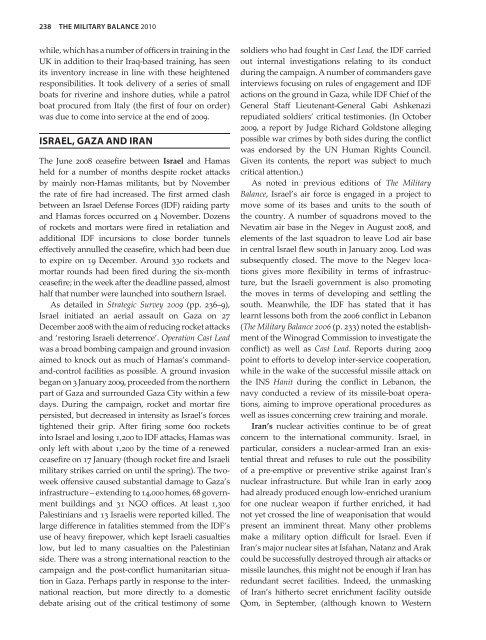Create successful ePaper yourself
Turn your PDF publications into a flip-book with our unique Google optimized e-Paper software.
238 ThE MiliTAry BAlANcE 2010<br />
while, which has a number of officers in training in the<br />
UK in addition to their Iraq-based training, has seen<br />
its inventory increase in line with these heightened<br />
responsibilities. It took delivery of a series of small<br />
boats for riverine and inshore duties, while a patrol<br />
boat procured from Italy (the first of four on order)<br />
was due to come into service at the end of 2009.<br />
IsRAel, GAzA And IRAn<br />
The June 2008 ceasefire between Israel and Hamas<br />
held for a number of months despite rocket attacks<br />
by mainly non-Hamas militants, but by November<br />
the rate of fire had increased. The first armed clash<br />
between an Israel Defense Forces (IDF) raiding party<br />
and Hamas forces occurred on 4 November. Dozens<br />
of rockets and mortars were fired in retaliation and<br />
additional IDF incursions to close border tunnels<br />
effectively annulled the ceasefire, which had been due<br />
to expire on 19 December. Around 330 rockets and<br />
mortar rounds had been fired during the six-month<br />
ceasefire; in the week after the deadline passed, almost<br />
half that number were launched into southern Israel.<br />
As detailed in Strategic Survey 2009 (pp. 236–9),<br />
Israel initiated an aerial assault on Gaza on 27<br />
December 2008 with the aim of reducing rocket attacks<br />
and ‘restoring Israeli deterrence’. Operation Cast Lead<br />
was a broad bombing campaign and ground invasion<br />
aimed to knock out as much of Hamas’s commandand-control<br />
facilities as possible. A ground invasion<br />
began on 3 January 2009, proceeded from the northern<br />
part of Gaza and surrounded Gaza City within a few<br />
days. During the campaign, rocket and mortar fire<br />
persisted, but decreased in intensity as Israel’s forces<br />
tightened their grip. After firing some 600 rockets<br />
into Israel and losing 1,200 to IDF attacks, Hamas was<br />
only left with about 1,200 by the time of a renewed<br />
ceasefire on 17 January (though rocket fire and Israeli<br />
military strikes carried on until the spring). The twoweek<br />
offensive caused substantial damage to Gaza’s<br />
infrastructure – extending to 14,000 homes, 68 government<br />
buildings and 31 NGO offices. At least 1,300<br />
Palestinians and 13 Israelis were reported killed. The<br />
large difference in fatalities stemmed from the IDF’s<br />
use of heavy firepower, which kept Israeli casualties<br />
low, but led to many casualties on the Palestinian<br />
side. There was a strong international reaction to the<br />
campaign and the post-conflict humanitarian situation<br />
in Gaza. Perhaps partly in response to the international<br />
reaction, but more directly to a domestic<br />
debate arising out of the critical testimony of some<br />
soldiers who had fought in Cast Lead, the IDF carried<br />
out internal investigations relating to its conduct<br />
during the campaign. A number of commanders gave<br />
interviews focusing on rules of engagement and IDF<br />
actions on the ground in Gaza, while IDF Chief of the<br />
General Staff Lieutenant-General Gabi Ashkenazi<br />
repudiated soldiers’ critical testimonies. (In October<br />
2009, a report by Judge Richard Goldstone alleging<br />
possible war crimes by both sides during the conflict<br />
was endorsed by the UN Human Rights Council.<br />
Given its contents, the report was subject to much<br />
critical attention.)<br />
As noted in previous editions of The Military<br />
Balance, Israel’s air force is engaged in a project to<br />
move some of its bases and units to the south of<br />
the country. A number of squadrons moved to the<br />
Nevatim air base in the Negev in August 2008, and<br />
elements of the last squadron to leave Lod air base<br />
in central Israel flew south in January 2009. Lod was<br />
subsequently closed. The move to the Negev locations<br />
gives more flexibility in terms of infrastructure,<br />
but the Israeli government is also promoting<br />
the moves in terms of developing and settling the<br />
south. Meanwhile, the IDF has stated that it has<br />
learnt lessons both from the 2006 conflict in Lebanon<br />
(The Military Balance 2006 (p. 233) noted the establishment<br />
of the Winograd Commission to investigate the<br />
conflict) as well as Cast Lead. Reports during 2009<br />
point to efforts to develop inter-service cooperation,<br />
while in the wake of the successful missile attack on<br />
the INS Hanit during the conflict in Lebanon, the<br />
navy conducted a review of its missile-boat operations,<br />
aiming to improve operational procedures as<br />
well as issues concerning crew training and morale.<br />
Iran’s nuclear activities continue to be of great<br />
concern to the international community. Israel, in<br />
particular, considers a nuclear-armed Iran an existential<br />
threat and refuses to rule out the possibility<br />
of a pre-emptive or preventive strike against Iran’s<br />
nuclear infrastructure. But while Iran in early 2009<br />
had already produced enough low-enriched uranium<br />
for one nuclear weapon if further enriched, it had<br />
not yet crossed the line of weaponisation that would<br />
present an imminent threat. Many other problems<br />
make a military option difficult for Israel. Even if<br />
Iran’s major nuclear sites at Isfahan, Natanz and Arak<br />
could be successfully destroyed through air attacks or<br />
missile launches, this might not be enough if Iran has<br />
redundant secret facilities. Indeed, the unmasking<br />
of Iran’s hitherto secret enrichment facility outside<br />
Qom, in September, (although known to Western


